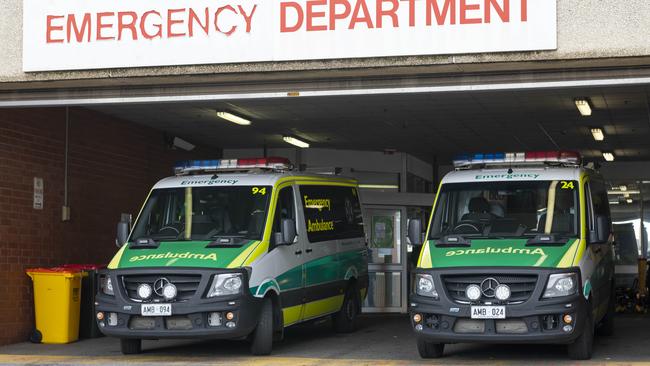Inquest finds Beverly Coats, Heather West and Lorna D’Souza died at QEH from undiagnosed aortic dissection
Three women died after presenting to an Adelaide hospital with a rare undiagnosed condition – with one found on her bathroom floor, an inquest found.
SA News
Don't miss out on the headlines from SA News. Followed categories will be added to My News.
Three women died after presenting to the emergency department at the Queen Elizabeth Hospital from the same undiagnosed condition – but only one of those deaths was preventable, an inquest has found.
An inquest into the deaths of three women – Beverley Joy Coats, Heather Maud West and Lorna Margaret D’Souza – found each of the women died from haemopericardium due to aortic dissection, or a tear in the body’s main artery.
Mrs Coats, 73, was found unresponsive in her hospital bathroom on August 2, 2016, while Mrs West died shortly after she returned to the ED via ambulance on May 2, 2017.
Mrs D’Souza became unresponsive during her journey home after discharge from the hospital, but was returned immediately to the ED where she died soon after on May 27, 2019.
In inquest findings handed down by Coroner Naomi Kereru, she notes that because none of the women had been diagnosed with aortic dissection they each “went without effective treatment”.
However, she found only Mrs West’s death was preventable, while the deaths of Mrs Coats and Mrs D’Souza were not preventable.
Mrs Coats had presented at hospital three times within three weeks with “insufficient attention” given to her representations and “the reasons behind them”. Her last admission was just a few days before her death.

Ms Kereru found Mrs Coats’ multiple comorbidities and the location of her aortic tear meant her death was “not preventable in all the circumstances”.
Similarly, she said Mrs D’Souza was in the ED “for a relatively short amount of time” and there “would not have been sufficient time to surgically intervene to prevent her death”.
However, in the case of Mrs West, Ms Kereru said she had presented at the hospital with “a classic sign of aortic dissection”, being central chest pain in her back.
She said her “symptoms should have raised suspicion for aortic dissection” and there had been “sufficient time” to have surgically intervened.
Ms Kereru said the deaths of all three women “highlighted the need for changes to the Acute Coronary Syndrome (ACS) Pathway” – the hospital’s guide for diagnosing patients with suspected acute coronary conditions – “to bring the differential diagnosis to the forefront of the minds of clinicians in a busy ED setting”.
She said a doctor had given evidence that “if you are not thinking about aortic dissection, you will miss it”.
She said expert evidence at the inquest noted the condition was rare and many doctors in emergency departments around Australia “may never see a case or aortic dissection in their professional lifetime”.
“There needs to be a level of consultant support and continual education on the possibility of aortic dissection and how it may present,” she said.
Ms Kereru made a recommendation to the Health Minister and SA Health to “include a step immediately” in the hospital’s ACS Pathway to consider aortic dissection as a possible cause of serious chest pain.
She also recommended each of the state’s local health networks consider developing a regular education program regarding aortic dissection presentations and diagnosis and doctors flag aortic conditions on a patient’s My Health Record.


